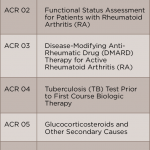
Natalya Kokhanova / shutterstock.com
We all have a short list of famous individuals whose writings inspire us and guide us. At the start of my presidential year, I turned to my own short list for some words of wisdom from Peter Drucker, whom many consider to be the founder of modern management theory. Underpinning Drucker’s teachings is a strong belief that success in anything begins with effectiveness. To be effective within any organization, he notes that one must never ask “What do I want to do?” Rather, one must ask: “What needs to be done?” followed by the next equally important question: “What is the right thing to do for the organization?”1
As I look back over this past year, I see the efforts of many talented and dedicated volunteers, who, together with our outstanding staff, have repeatedly asked these two key questions as they approached their work on our various ACR committees. It is not so surprising, then, to see how effective they have been and how much they have accomplished for all of us. It has truly been my honor to serve with them.
Advocacy
The work of our advocacy team never ceases. They must repeatedly step up to draw the attention of our nation’s leaders to issues that adversely affect our daily ability to care for patients, including the requirements to follow step therapy and obtain prior authorizations for necessary treatments—plus the many other administrative burdens that interfere with access to care on so many levels.
Through their efforts, the proposed consolidation of evaluation and management codes (which would have resulted in disastrous cuts to Medicare reimbursement in cognitive, time-intensive specialties, such as ours) has been replaced by a proposal from the Centers for Medicare & Medicaid Services that promises to more appropriately value the time and expertise that we in rheumatology provide to our patients. Likewise, we have been able to gain bipartisan support in both the House and the Senate for bills that would eliminate or streamline the requirements for step therapy.
As we continue to push for these changes and others, the path the ACR must walk to be effective on Capitol Hill is narrow and straight down the middle of the aisle.
RISE & the Ascent of Data-Driven Approaches
The RISE registry is now the largest rheumatology registry in the world, with data collected on almost 2 million patients to date. It is truly amazing to look back and see how far we have come, just five years after the registry was launched—an accomplishment that serves as another testament to the effectiveness, and truly the passionate commitment, of our volunteers and staff. At the RISE Summit this past May, a cross-sectional representation of our specialty met to chart the strategic direction for the next phase of our registry, which included capturing patient-reported outcomes and improving clinical outcomes through benchmarking and specific quality outcome measures, as well as developing ways to use the longitudinal data collected on our patients for robust clinical investigation, especially in rare diseases.
All the while, RISE continues to serve our practice community by helping all RISE participants successfully meet the requirements for value-based reimbursement through the Merit-Based Incentive Payment System. If the rapid ascent of the RISE registry these past few years is any indication of the speed and steep upward angle of its future trajectory, I expect we will see RISE continue to transform our specialty for the benefit of our patients.
Communication & Public Awareness

Natalya Kokhanova / shutterstock.com
Getting the word out about what we do and for whom we do it is always a challenge. Our Committee on Communications and Marketing has worked tirelessly to raise the visibility of our specialty.
Rheumatic Disease Awareness Month (RDAM), now in its fourth year, is drawing attention to the wide array of diseases we treat. As part of the Simple Tasks campaign, designed to enable patients to get reliable information about their illness and connect with the larger community of patients whose lives have been affected by rheumatic disease, RDAM takes the personal challenge of living with a rheumatic disease public. This year, we enthusiastically welcomed Venus Williams as our spokesperson. Her international star power and inspiring story raise us all to a new level of effective communication about our specialty.
Clinical Practice Guidelines
This year more than any other, our Committee on Quality of Care has been particularly prolific, completing six clinical practice guidelines. Most recently, the ACR has developed a new guideline/criteria app that features several of our guidelines, with more to be added as they are developed. This free app will allow for wider dissemination of, and far more convenient access to, our guidelines—much more effective indeed.
Education
I am continually amazed by the scope of work handled by our Committee on Education—and especially the huge task undertaken by our Annual Meeting Planning Committee in successfully bringing forth the most important educational event of our specialty.
This year has brought many fresh looks at our work at the ACR, all with an eye to positioning ourselves for greater effectiveness in serving our members.
This year, we developed a new Education Strategic Plan, with the intent of taking a fresh approach to our educational activities and more effectively delivering our content, in ways that are accessible, flexible, relevant, customizable, user-friendly and available any time. To this end, we introduced several exciting pilots at this year’s Annual Meeting to enhance our learners’ experience. If successful, we will expand these innovations in 2020, while piloting others to meet our members’ learning needs and preferences.
More That’s New
This year has also brought many other fresh looks at our work at the ACR, all with an eye to positioning ourselves for greater effectiveness in serving our members. For example, we have changed the name of our health professionals’ member organization to ARP, Association of Rheumatology Professionals, to better reflect its broad range of members and call attention to the importance of the entire interprofessional team in our specialty.
Also new this year was the premiere of our online open access journal, ACR Open Rheumatology (ACROR).
Another important change: We have welcomed COIN as an ACR special committee. COIN stands for collaborative initiatives and brings together individual and organizational collaborators so we can leverage our expertise and resources to assist those in the community with the greatest need—our way of fulfilling our role as stewards of our profession.
Probably the greatest change for us in this very busy year has been the retirement of our beloved Executive Vice President Mark Andrejeski, who stepped down after a 32-year career that transformed our professional society and the specialty it serves. In his stead, we welcomed Steve Echard, IOM, CAE, who has skillfully assumed his leadership position at the ACR and, not surprisingly, has almost immediately asked those same two Peter Drucker questions that mark an effective executive. We, at the ACR, feel fortunate—both for the rich legacy that Mark created for us and the running start with which Steve has hit the ground.
The dictionary definition of effectiveness is “the degree to which something is successful in producing a desired result.” In my first presidential column—a look ahead for the ACR—I noted that we had a promise to keep: to be here for you. Now, as I look back on this whirlwind year of activities, I find myself in awe of the effectiveness of our volunteers and staff in keeping this promise for all of us in rheumatology.
As I end this last column of my presidential year, there are just two words left for me to say: Thank you.
 Paula Marchetta, MD, MBA, is a rheumatologist in New York City and the CEO and managing partner of Concorde Medical Group, a multi-specialty private group practice affiliated with NYU Langone Health. She teaches at NYU School of Medicine, where she is a clinical professor. Dr. Marchetta is the 82nd ACR president.
Paula Marchetta, MD, MBA, is a rheumatologist in New York City and the CEO and managing partner of Concorde Medical Group, a multi-specialty private group practice affiliated with NYU Langone Health. She teaches at NYU School of Medicine, where she is a clinical professor. Dr. Marchetta is the 82nd ACR president.
Reference
- Drucker PF. What makes an effective executive. Harvard Business Review. 2004 Jun.



